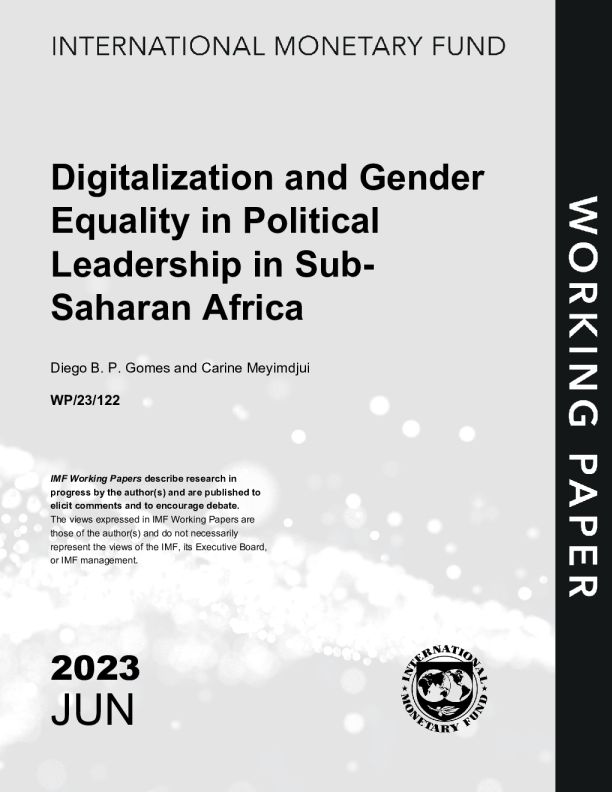Private Savings and COVID-19 in Sub-Saharan Africa

PrivateSavingsandCOVID-19 inSub-SaharanAfrica BoileauLoko,NelieNembot,andMarcosPoplawski-Ribeiro WP/22/176 IMFWorkingPapersdescriberesearchinprogressbytheauthor(s)andarepublishedtoelicitcommentsandtoencouragedebate. TheviewsexpressedinIMFWorkingPapersarethoseoftheauthor(s)anddonotnecessarilyrepresenttheviewsoftheIMF,itsExecutiveBoard,orIMFmanagement. 2022 SEP ©2022InternationalMonetaryFundWP/22/176 IMFWorkingPaper AfricanDepartment PrivateSavingsandCOVID-19inSub-SaharanAfricaPreparedbyBoileauLoko,NelieNembot,andMarcosPoplawski-Ribeiro AuthorizedfordistributionbyBoileauLokoSeptember2022 IMFWorkingPapersdescriberesearchinprogressbytheauthor(s)andarepublishedtoelicitcommentsandtoencouragedebate.TheviewsexpressedinIMFWorkingPapersarethoseoftheauthor(s)anddonotnecessarilyrepresenttheviewsoftheIMF,itsExecutiveBoard,orIMFmanagement. ABSTRACT:ThepaperreexaminesthemainprivatesavingsdeterminantsinSub-SaharanAfrica(SSA),followedbyananalysisoftheCOVID-19pandemicimpactonprivatesavingsinSSAandothercountrygroupings.Usinganunbalancedpaneldatafrom1983−2021for31SSAeconomies,thepaperfindsthatrealpercapitaeconomicgrowthremainsakeyhistoricaldeterminantofprivatesavingsintheregion.Incontrastwithotherregions,privatesavingrateshavenotincreasedduringCOVID-19inSSA.Instead,COVID-19deathsinourestimationsaresignificantlyassociatedwithadeclineinprivatesavingsinSSA.Robustnesschecksandadescriptiveanalysisofhouseholdsurveysduringthepandemiccorroboratethoseresults. RECOMMENDEDCITATION:Loko,Boileau,NelieNembot,andMarcosPoplawski-Ribeiro,2022.“PrivateSavingsandCOVID-19inSub-SaharanAfrica.”IMFWorkingPaper,No.22/176,March. JELClassificationNumbers: E21;O55;I15;C33 Keywords: PrivateSavings;Sub-SaharanAfrica;COVID-19;EconomicGrowth Author’sE-MailAddress: bloko@imf.org;Nelie.Angele.Nembot@USherbrooke.ca;mpoplawskiribeiro@imf.org WORKINGPAPERS PrivateSavingsandCOVID-19inSub-SaharanAfrica PreparedbyBoileauLoko,NelieNembot,andMarcosPoplawski-Ribeiro1 1TheauthorsthankAnnaBelianska,YongquanCao,MarianaColacelli,FrancescoGrigoli,AlexanderHerman,SergiiMeleshchuk,RominaKazandjian,MahamoudIslam,AmineMati,PrithaMirtha,LucaRicci,FatouThioune,CharalambosTsangarides,RobertZymek,andtheparticipantsoftheAfricanDepartmentResearchTherapyandAFRC2Divisionseminarsforhelpfulcommentsanddiscussions.Weacknowledge,inparticular,AmineMatiandCorineDelechatforsharingtheirdatasetontheUNDPhousehold surveysduringCOVID-19andFrancescoGrigoliandAlexanderHermanforsharingtheirdatabaseonprivatesavings.RuthAkor,CarmenAvila-Yiptong,andLinnetMbogoprovidedexcellentresearchassistance.Allremainingerrorsareourown.TheopinionsexpressedhereinarethoseoftheauthorsanddonotnecessarilyreflectthoseoftheInternationalMonetaryFund. Contents Introduction5 TrendsandStylizedFactsonPrivateSavingsandCOVID-198 MacroAnalysis12 MicroAnalysis15 HistoricalSavingsDeterminantsinSSAandAcrossIncomeGroups15 BaselineModel16 Data18 BaselineResults19 TestingOtherSavingsDeterminantsAcrossIncomeGroups21 SavingsDeterminantsduringCOVID-1924 EstimatingCOVID-19’sImpactontheChangeinPrivateSavingRates25 StringencyofCOVID-19PreventiveMeasures26 COVID-19Vaccination29 CombiningDifferentCOVID-19-RelatedVariables30 RobustnessChecksandAdditionalTests31 PrivateSavingsasRatiotoGDP32 BankDeposits35 Conclusions37 AnnexI.CountryGroupsandSample40 AnnexII.DescriptiveStatistics42 References43 Introduction LowprivatesavingratesinSub-SaharanAfrica(SSA)representoneofthemainbottlenecksfordevelopmentintheregion.Theyareassociated,forexample,withalackofconsumptionsmoothing,riskmanagement,andfinancingofimportantlifegoalssuchaseducationandstartingabusiness,particularlyforthemostvulnerableinsociety.Domesticsavingsarealsoakeycomponentinsolvingthefinancingpuzzletoachievethesustainabledevelopmentgoals(SDGs)(Gasparandothers,2019)andtofightclimatechange(Belianskaandothers,2022)intheregion. WhileprivatesavingratesinSSAhavebeencatchingupinrecentyearspriortothepandemic,itsdistributionremainsstillbelowotheremerginganddevelopingeconomies(EMDEs)countrygroups(Figure1).Inaddition,thereissignificantheterogeneityacrosscountries,withsavingsnotablylowinfragilestatesandvolatileineconomiessubjecttoexogenousshocks,suchasnaturaldisastersorcommoditypricefluctuations.Inthe meantime,theemergenceofCOVID-19inlate2019ledtoharmfuleconomicimpactsintheregion(MiguelandMushfiqMobarak,2021),whichcouldhavealsoaffectedtheaccumulationofprivatesavings. ThemacroeconomiccontextinSSAevenbeforeCOVID-19hadalreadycreatedmanychallengesforsavingsbuild-up,includingthehighdebtlevelsinseveraleconomies(Selassie,2018);fastpopulationgrowthrates;andelevateduncertaintyontheexternalenvironment,includingforcommodityprices(Gruss,Nabar,andPoplawski-Ribeiro,2020).Inaddition,althoughaccesstoformalfinancialproductshavegrowninrecentyears—throughthegradualdevelopmentofbankingandcapitalmarketsinSSAandtheriseofdigitalfinancialservicesandinclusion—alargeshareofthepopulation(closeto46percent)isstillnotabletosaveatallandlessthanathirdoftheexistentsaversin2017,forexample,hasdoneitthroughformalfinancialinstitutions(De




